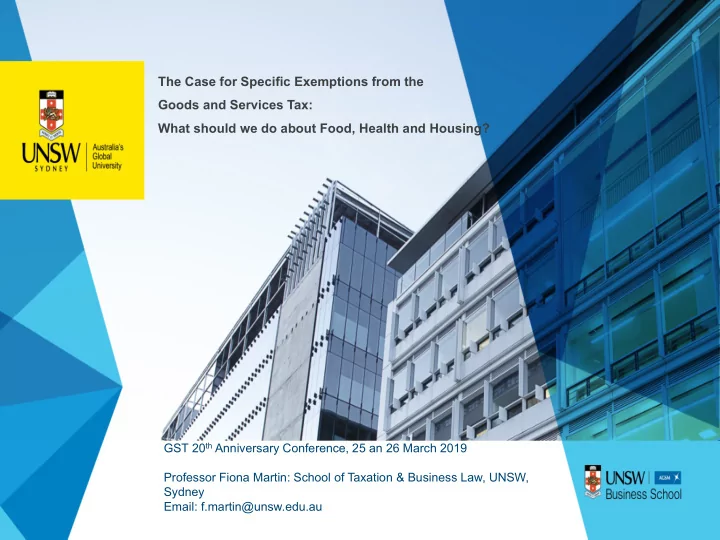

The Case for Specific Exemptions from the Goods and Services Tax: What should we do about Food, Health and Housing? GST 20 th Anniversary Conference, 25 an 26 March 2019 Professor Fiona Martin: School of Taxation & Business Law, UNSW, Sydney Email: f.martin@unsw.edu.au
The Case for Specific Exemptions from the Goods and Services Tax What should we do about Food, Health and Housing? ‘Of all the preposterous assumptions of humanity over humanity, nothing exceeds most of the criticisms made on the habits of the poor by the well- housed, well-warmed and well fed.’ Herman Melville 2
Food: Zero rated and input taxed • Australia and 4 other OECD countries that apply a zero rate to specific food items. • Canada, Mexico, Ireland, and the United Kingdom. • The majority of European countries do however apply reduced rates to various food items or exempt them from GST/VAT as input tax supplies 3
Equity • The greater proportional cost of food to the income of low income earners as opposed to high income earners. • Given the necessity of food expenditure, a GST without an exemption for food is considered highly regressive 4
Literature • Carlson and Patrick argue that taxing certain items at a lower or zero rate is ‘probably the most frequently used method of alleviating the regressivity of a consumption tax’ George Carlson and Melanie Patrick, ‘Addressing the Regressivity of a Value-added Tax’ (1989) 42(3) National Tax Journal 339, 345. • Ireland 2004/05: lowest income decile paid 16% of their disposable income in VAT, richest households paid 6% Eimear Leahy, Sean Lyons and Richard SJ Tol, ‘The Distributional Effects of Value Added Tax in Ireland’ (2011) 42(2) The Economic and Social Review 213, 219-220. 5
Australia: 2016 6
2018 OECD Report • Reduced VAT rates for basic food ‘provide in general greater support to the poor than the rich as a proportion of household income or expenditure’. • But - the report argues that reduced VAT rates are a very poor distributive tool. 7
Politics • Prior to the GST - The Australian Council of Social Service, business groups and other peak bodies- discussed tax reform. • Agreed in principle to the introduction of a broad based consumption tax • ‘emphasis was placed on the need to protect those on social security and those on low wages from any adverse changes’ 8
Healthy Food • Rise in the price of fruits and vegetables may make Australian diet and consequently health worse. • The removal of zero rating of 10% in Australia would mean that fruit consumption would decline by 4.9% and vegetable consumption by 4.8%. • Veerman and Cobiac – less fruit and veggies leads to increase in the incidence of heart disease and cancers 9
Health • Traditionally, the concept of healthcare as a public good has afforded it special treatment in terms of consumption tax. • It’s a merit good/service 10
Australian rationale • GST-free status of healthcare was competitive neutrality of the public and private sectors • Many public healthcare services were provided free or at small cost so – ‘applying taxes to healthcare would place the private health sector with its heavier reliance on direct fees at a competitive disadvantage with the public health system’ 11
Residential Housing • From a legal perspective, residential premises are assets and their supply whether sale or rental should be subject to GST • The supply of real property should be taxed and characterised as a taxable supply with creditable acquisitions (for both business and private use) and there should be some form of consumption tax on the rental value 12
Owner occupiers • Owner occupiers, when selling their residences are not subject to the GST as they would not be selling their house in the course of carrying on an enterprise, but essentially selling their home 13
Housing • If the consumption of residential premises were taxed in the normal way then this would result in a large compliance burden. • Every home owner and tenant would need to register and GST would need to be imposed each year on the value of annual consumption of the owner-provided assets 14
Equity • Those on lower incomes spend most of their income on housing 15
Australia: 2016 16
Equity • Low income can last a life time • Eg women, migrants, those in low skilled work 17
Politics • Australia’s ideal of home ownership • Home ownership is viewed in many jurisdictions as an important policy objective which is actually encouraged through various taxation incentives • Community outrage 18
Conclusion • There are strong grounds for exemption from GST – Equity – Politics – Merit goods 19
Recommend
More recommend